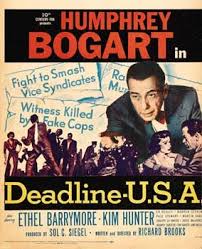
DEADLINE U.S.A.
US, 1952, 85 minutes, Black and White.
Humphrey Bogart, Ethel Barrymore, Kim Hunter, Ed Begley. Warren Stevens, Martin Gabel, Jim Backus, Paul Stewart.
Directed by Richard Brooks.
Deadline U.S.A. is an above average social drama, written and directed by Richard Brooks, who has directed (and frequently written) some very interesting films such as Cat on a Hot Tin Roof, Elmer Gantry, Lord Jim, The Professionals, In Cold Blood, The Happy Ending.
The film's main merits are a typical piece of Bogart casting and acting along with crisp and sardonically witty dialogue. This keeps the film moving and continually interesting. The social concern is also of interest. The tone is super-patriotic-American of the early 50's. Nobility, honesty, toughness of the old brigade are the hallmarks. Ethel Barrymore's performance reinforces these traits. This was the McCarthy? era and the film shows great faith in honesty
in social reform.
1. Why was this film something more than just a routine story of a newspaper and a newspaper man?
2. Did this picture of a huge American daily paper ring true to your impressions and experience of newspapers, their service to the community and performing some role as social conscience? Why?
3. Even though this film belongs to the early 501s, are the social issues it raises similar to the issues of our own day?
4. Were you convinced by the spirit of fellowship and drive amongst the staff of "The Day"? Especially at the wake, in the scenes of preparing copy?
5. What kind of a man was Hutchison? Was he real? Consider his dedication, his typical Bogart toughness, quick, sardonically humorous, honest, socially conscious. Does he represent the ideal newspaper man? How?
6. Was it relevant that Hutchison was divorced from his wife? Did it add anything to the film except some well-integrated psychological worry for Hutchison at the same time as tensions about the sale of the paper and the Rienzi case?
7. Was there anything wrong with the Garrison family selling the newspaper? Was it a necessary investment, or were they trying to kick their dead father? Why? (The daughters were made to look villains.)
8. Why did Mrs. Garrison wish to sell? Why did she change her mind? What kind of woman was she? was she presented as the feminine equivalent of Bogart? Why?
9. What kind of newspaper was "The Day"? How did it contrast with "The Standard"? (Bogart's criticism of people who want puzzles, comics, horoscopes and if they happen to stumble on the front page, they find nudes.) Did "The Day" have the right to investigate and expose Rienzi? To work without the police, to be a social conscience and to clean up the city? Why?
10. Was Rienzi just another crook or was he typical of big business gangsters who have so many strings to pull that they can't be touched by police?
11. Did you find the workings of the paper interesting? Did the paper have the right to interfere in people's lives - e.g. Warden? Hutchison seemed to have powers of life and death.
12. The film took a national scope with U.S.A. in the title. Did you find the film too nationalistic in outlook and tone - too patriotically American? It presented the ideal cinema hero and the great American virtues; the great American heroine who says she is more pliable than the younger generation who are more brittle and break more easily.
13. Did Norah's returning to Hutchison seem too sentimental? Was it necessary for the film? How well was it prepared for by Mrs. Garrison's talk about her own married life?
14. was it significant for the message of the film that we were not told about "The Day's" future?
15. What light do films like this throw on the social awareness of the 50's, especially considering that this was the McCarthy? period? The film speaks about freedom of the press, speaking out and about truth and criticism.